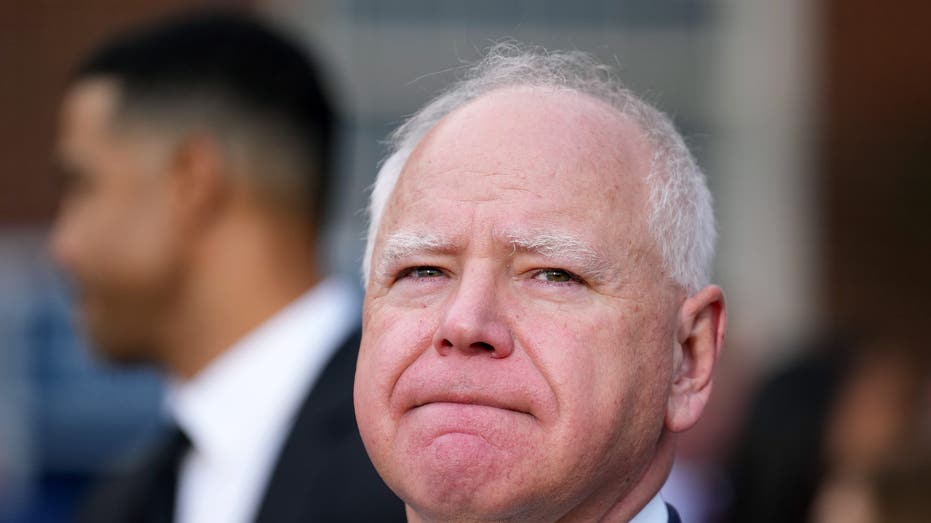As the political landscape continues to evolve ahead of the upcoming elections, Minnesota Governor Tim Walz has made headlines with his candid remarks regarding the prospects of the Democratic Party retaking control of the U.S. Senate. In a recent interview, Walz expressed his skepticism, indicating a sense of urgency and concern over the current state of affairs within the party.
Walz, a prominent figure in the Democratic Party, has been closely monitoring the political climate as midterm elections approach. His assessment of the Senate situation reflects a broader sentiment among many Democrats who are grappling with a myriad of challenges that could impact their chances in the electoral battleground. As voters prepare to head to the polls, the stakes have never been higher.
One of the major points raised by Walz is the increasingly polarized nature of American politics. He pointed out that political divisions seem to be deepening, making it a tough environment for Democrats looking to reclaim seats. The growing ideological gaps between the parties are contributing to a climate where voters are more entrenched in their beliefs, potentially hampering outreach efforts aimed at swing voters.
Walz also highlighted the significance of recent polling data that indicates potential obstacles for the Democrats’ Senate ambitions. Many states currently represented by Democratic senators are facing tough electoral challenges, as Republicans rally their base and strategically target vulnerable incumbents. The complex dynamics of the electoral map have led experts to advise caution and realism as the party formulates its strategies.
Another critical issue raised in the conversation concerns the impact of inflation and economic uncertainties on voter sentiment. As inflation rates experience fluctuations, household budgets are increasingly strained, leading many voters to prioritize economic stability over political party allegiance. This shift in priorities could pose a significant threat to Democratic candidates who might struggle to resonate with voters’ immediate concerns.
The recent economic trends, coupled with high-profile national issues such as crime and immigration, have inevitably shifted the focus away from legislative achievements that Democrats hoped would garner support. Walz acknowledged that it is increasingly challenging for voters to connect with the narratives that Democrats construct around policy successes when fundamental issues remain at the forefront of public discourse.
Furthermore, Walz’s feelings of pessimism are compounded by national dynamics. The incumbent administration’s popularity can directly affect local races, as seen in previous election cycles where dissatisfaction with national leadership has impacted down-ballot candidates. As midterm elections are historically challenging for the party in power, the implications of national sentiments cannot be overlooked.
The governor’s outlook has also led him to call for a more concerted and united effort among Democrats to address these hurdles. He emphasized the necessity for candidates to engage authentically with their constituents, focusing on listening to their concerns and crafting meaningful solutions that resonate on a personal level.
Moreover, Walz pointed to the importance of grassroots movements and local organizations as vital tools for mobilizing support and bridging divides within communities. His belief is that community engagement will be crucial in not only galvanizing support but also countering the narratives pushed by opposition parties.
As the Democrats prepare for the election cycle, leaders like Walz understand that the challenges ahead are multifaceted and demand a strategic, adaptable approach. Although his demeanor suggests a struggle ahead, he also reiterates the importance of hope and resilience in the democratic process.
Looking ahead, Walz urged the need to focus on messaging that highlights the party’s commitment to addressing tangible issues that affect people daily, such as healthcare, education, and living wages. Strengthening connections with voters and ensuring representation of their interests is essential for the survival of Democratic hopes in the Senate.
In the face of adversity, Democrats are being called upon to unify and build coalitions that can address the widespread issues affecting citizens, enabling them to formulate a comprehensive plan that not only targets winning Senate seats but also translates into meaningful governance.
As communities navigate the intricate web of local and national politics, constituents are challenged to consider who will best represent their interests. Democrat candidates will need to gain traction and presence in markets where their messages might have been overshadowed by the loud voices of opposition.
In a landscape that appears increasingly challenging, the focus remains on ensuring that values of inclusivity, economic opportunity, and social justice resonate with the electorate. Only time will reveal the true outcome of these efforts as the elections draw nearer.
The path ahead is steep; however, the engagement of local leaders, activists, and concerned citizens remains paramount. The sense of urgency resonated in Walz’s speech serves as a clarion call for Democrats to rally against skepticism and to hope for better results as they gear up for the midterm elections.
Ultimately, the reflections shared by Governor Walz reveal a nuanced understanding of the political dynamics at play. As challenges loom large, it will be imperative for the Democratic Party to forge ahead with clear strategies and steadfast determination. The stakes are high, and the clock is ticking, leaving party leaders to contemplate how best to mobilize supporters and reclaim the narrative in critical Senate races.
In conclusion, while Walz’s sentiments may be rooted in a sense of realism about the current state of affairs, they also underscore the importance of grassroots mobilization, effective messaging, and unity among Democrats. Acknowledging that the environment is tough is the first step; now, it is time for Democrats to rise to the occasion and embrace the possibilities that lie ahead as they strive for a stronger foothold in the Senate.
































